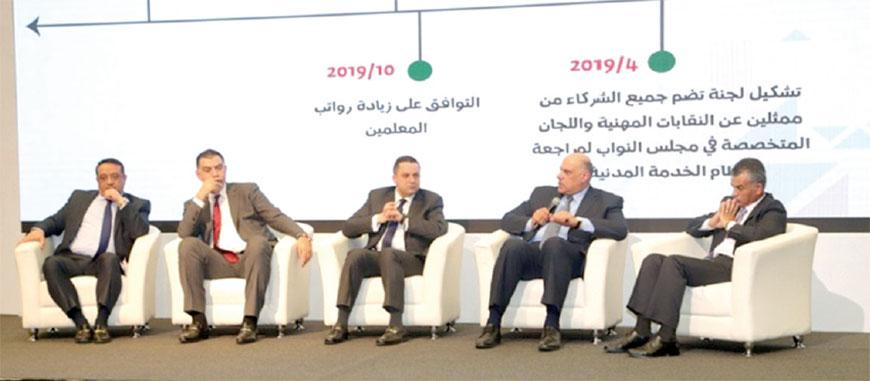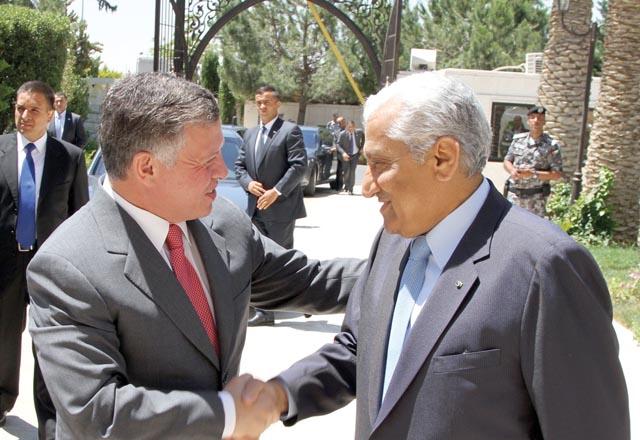You are here
Royal Discussion Paper offers ‘timely critique’ — analysts
By Dana Al Emam - Oct 26,2016 - Last updated at Oct 26,2016
AMMAN — His Majesty King Abdullah’s sixth Royal Discussion Paper is a “timely critique” of ways in which individuals and institutions violate the principle of the rule of law, analysts said on Tuesday.
The discussion paper on the rule of law and the civil state, published earlier in October, draws a roadmap for how to reach the desired civil state, where law applies to all and religion is a key contributor to the value system and social norms.
Speaking on a panel at the Arab Thought Forum (ATF), former senate president Taher Masri, said the paper represents core democratic and reform principles that must be implemented on the ground without delay to sustain Jordan’s stability.
The paper clearly identified a lagging administrative performance while noting the need for all constitutional institutions to work more efficiently to better serve the nation, Masri added.
“The executive body has to understand and embrace the gist of the Discussion Paper and start implementing it,” the former prime minister said, noting that it builds on the previous five Royal Discussion Papers.
While the paper “bravely” pointed out administrative failures, it expressed discontent with “violent” social reactions towards emerging issues in which people had conflicting views, such as amendments to the school curricula, said former minister of awqaf and Islamic affairs Hayel Dawood.
Recent disagreements over changes to the school curricula became heated at times, with demonstrators burning books at a protest in Amman.
Dawood noted that nepotism (“wasta”) in the administrative body and the failure of anti-graft bodies to perform well have weakened the public’s trust, a matter the Discussion Paper said must be addressed.
He acknowledged that some Muslim scholars wrongly confuse the concept of a civil state with a secular state.
The state established by Prophet Mohammad in Medina was a civil one, where all inhabitants were granted their rights and freedoms regardless of their religious and ethnic backgrounds, and they collectively stood against foreign threats, Dawood highlighted.
Musa Shteiwi, director of the University of Jordan’s Centre for Strategic Studies, identified some of the “scientifically registered changes” in Jordanian society that have led to weak law abidance, including an increase in law violations, the executive authority’s inability to enforce the law, a growing feeling of injustice and a regression in the sense of collective identity at the expense of minority and religious identities.
This has resulted in a sharp disagreement between political currents that could have developed into an ideological and political crisis, he said.
Meanwhile, he doubted the government’s ability to implement the changes called for in the sixth Discussion Paper, as the first paper was issued four years ago without real efforts by the government to implement it on the ground.
“The issue is in the current form of public administration,” he noted.
Meanwhile, Numan Khatib, a member of the Constitutional Court, said the Jordanian Constitution established a civil state in 1952, adding that it underwent several amendments to grant modernity and to guard democracy.
He noted that the religion of the state does not contradict it being a civil state.
Related Articles
AMMAN — The government on Thursday announced salary hikes for public servants, military personnel and pension increase for civil and militar
is Majesty King Abdullah on Wednesday underlined Jordan’s complete readiness to deal with any regional developments that may pose a threat to the Kingdom’s security and stability.
AMMAN — His Majesty King Abdullah drew a line in the sand regarding the aspired civil state, helping remove all doubts and controversies on


















